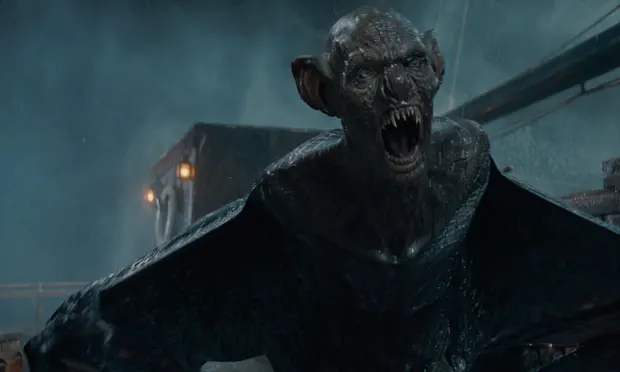In the realm of horror films, “The Last Voyage of the Demeter” sets sail with the ambitious goal of breathing new life into a chilling chapter from Bram Stoker’s iconic novel “Dracula.” Directed by André Øvredal, the film takes us on a perilous journey aboard a merchant ship bound for London. Unfortunately, despite its promising premise and nods to Stoker’s source material, this voyage ultimately leaves audiences stranded in a sea of missed opportunities and unfulfilled scares.
The film begins by introducing us to Captain Eliot (Liam Cunningham), a seasoned sailor who’s seen it all. As the Demeter prepares for yet another voyage, Eliot’s crew, which includes first mate Wojchek (David Dastmalchian) and cook Joseph (Jon Jon Briones), understands that they’re more than just colleagues; they’re a makeshift family. With new cargo and a young stowaway named Toby (Woody Norman), the stage is set for a harrowing journey that’s as much about survival as it is about unraveling the dark secrets that lie within the ship’s belly.
READ MORE: Red, White & Royal Blue” Film Review: A Trans-Atlantic Rom-Com with Royal Charm
Enter Clemens (Corey Hawkins), a doctor and philosopher whose Blackness is met with prejudice by some members of the crew. The ship’s course takes a sinister turn when it becomes clear that a vampire stowaway, Dracula (Javier Botet), is on board. The film’s pacing initially builds intrigue as the crew experiences unsettling omens and eerie noises, setting the stage for terror to come.
However, “The Last Voyage of the Demeter” falls short of its own aspirations. The film struggles to translate the creeping dread of Stoker’s novel into a visually compelling cinematic experience. Despite the ominous presence of Dracula, the scares are oddly muted, failing to elicit the spine-tingling fear that one would expect from a horror film of this nature.
One of the film’s missed opportunities lies in its inability to capitalize on the claustrophobic and isolated atmosphere of the ship. Instead of creating an overwhelming sense of dread, the film resorts to predictable jump scares and CGI-laden vampire attacks that fail to resonate. The suspense that should grip the audience as the sun sets and the crew’s safety wanes is lost in a series of underwhelming set pieces.
While the film attempts to inject modern themes into the narrative, such as feminism and racism, these efforts feel forced and disjointed. Rather than enhancing the story, these elements distract from the central horror and fail to create a cohesive and engaging experience.
“The Last Voyage of the Demeter” does find its footing in its final act, where desperation and hopelessness take center stage. This surge of energy and tension is a welcome shift, but it’s unfortunate that the film’s earlier segments couldn’t sustain the same level of engagement.
In conclusion, “The Last Voyage of the Demeter” sets sail with an intriguing premise but fails to fully deliver on its potential. Despite its strong cast and connection to a classic horror tale, the film struggles to capture the dread and terror that define the genre. It’s a voyage that leaves audiences wanting more — not in terms of jump scares, but in terms of the gripping fear that a true horror film should evoke. As the credits roll, one can’t help but wonder if this vessel was better left in the harbor.
“The Last Voyage of the Demeter” is slated to hit theaters on August 11th, offering a new perspective on a chilling chapter from “Dracula.” However, its inability to fully capitalize on its source material and translate it into a truly terrifying cinematic experience leaves much to be desired.
